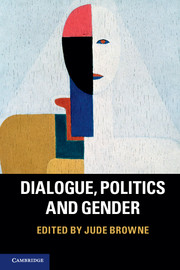Book contents
- Frontmatter
- Contents
- List of contributors
- Acknowledgements
- Introduction
- 1 Women and the standpoint of concrete others
- 2 Gender, discourse and non-essentialism
- 3 Universalism in feminist international ethics
- 4 Language, gender, dialogue, ethics
- 5 Between consensus and deconstruction
- 6 Trapped in a family portrait?
- 7 Gender, gesture and garments
- 8 What kind of dialogue do we need?
- 9 Deliberation, domination and decision-making
- Index
- References
5 - Between consensus and deconstruction
A feminist reading of dialogue
Published online by Cambridge University Press: 05 August 2013
- Frontmatter
- Contents
- List of contributors
- Acknowledgements
- Introduction
- 1 Women and the standpoint of concrete others
- 2 Gender, discourse and non-essentialism
- 3 Universalism in feminist international ethics
- 4 Language, gender, dialogue, ethics
- 5 Between consensus and deconstruction
- 6 Trapped in a family portrait?
- 7 Gender, gesture and garments
- 8 What kind of dialogue do we need?
- 9 Deliberation, domination and decision-making
- Index
- References
Summary
Dialogue has become one of the most central and intensely debated issues in political and moral philosophy. The implications that these debates have for our understanding of gender and identity are particularly important, though they are neither clear nor uncontested. Feminist scholars have, indeed, been rather ambivalent about the role and nature of dialogue. Dialogue is generally seen as a crucial element of an emancipatory approach, for it can provide women with a voice and thus create the preconditions for engendering a more just social and political order. But many feminist scholars are, at the same time, sceptical about how prevailing approaches to dialogue are conceptualised. They are particularly worried about framing dialogue as an effort to reach a global consensus, for many previous modern attempts to establish universal norms have been based on explicit but linguistically masked value systems that define the male as norm and the female as deviant.
To understand the importance of these linkages between dialogue, identity and gender it is necessary to take a step back and consider how dialogue became such a central philosophical issue in the first place. The history of philosophy is sometimes divided into three general periods: the ontological, the subjectivist, and the linguistic. The ancient philosophies and world religions provided comprehensive accounts of the cosmos in which humans were situated; modern philosophy was born with the ‘discovery’ of subjectivity by thinkers such as Descartes and Kant; while present-day philosophy is defined by ‘the linguistic turn’, a recognition that language practices set out what we can know about ourselves and the world. As with all such categorisations, this one is contentious, and closer examination of individual theorists and traditions reveals a complexity that confounds the threefold division. It does, however, help us understand why dialogue has become such a dominant concept in contemporary political theory.
- Type
- Chapter
- Information
- Dialogue, Politics and Gender , pp. 120 - 145Publisher: Cambridge University PressPrint publication year: 2013
References
- 1
- Cited by



